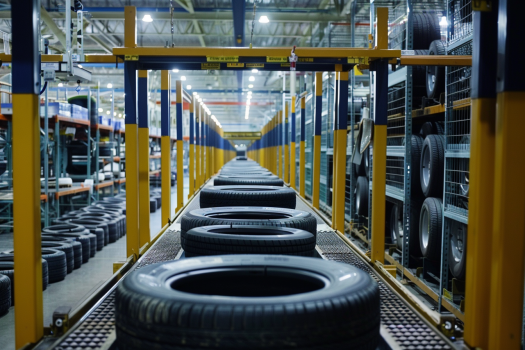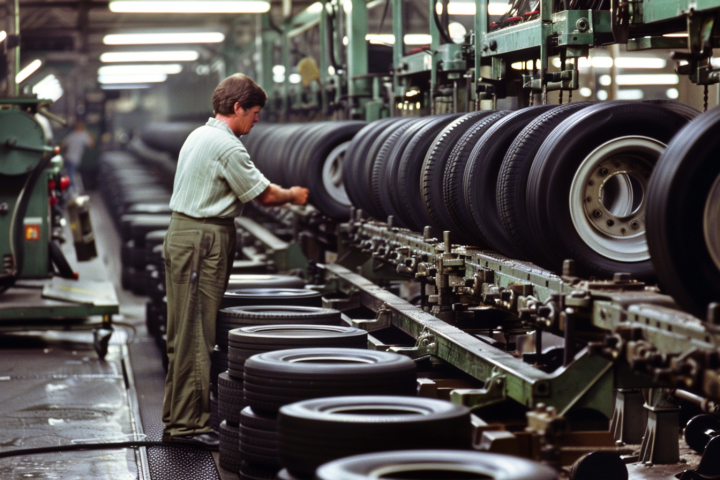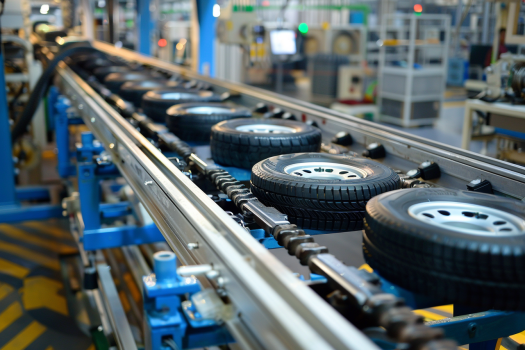Last Updated on 3 months
The Global Tire Industry and the Significance of Manufacturer Nationality
The tire industry, born in the early days of the automobile, has transformed into a dynamic, multi-billion-dollar global enterprise. It is fuelled by a complex network of international manufacturers, suppliers, researchers, and marketers.
Major players hail from established markets like the United States, Europe, and Asia, each bringing a distinct blend of tradition, technological prowess, and market strategies. American giants like Goodyear and Firestone have shaped the industry with innovation and massive production capabilities. The European titans Michelin, Pirelli, and Continental are renowned for their focus on quality, safety, and performance.
Asian powerhouses like Bridgestone and Yokohama have made significant strides in technology and efficiency. Emerging players from other regions also make their mark, further diversifying the global tire landscape.
This blog will explore this dynamic industry, specifically why consumers, businesses, and enthusiasts might care about a tire maker’s nationality.

The Significance of Knowing Tire Manufacturers’ Nationality
Understanding the nationality of tire manufacturers is crucial for several reasons.
- Firstly, it provides insights into the quality and technology standards that different countries uphold. For example, German manufacturers are known for their rigorous testing and precision, while Japanese firms are celebrated for their innovation and efficiency.
- Moreover, a tire brand’s nationality often reflects its heritage and expertise in specific tire types. Italian manufacturers, for instance, are famous for their high-performance tires suited for sports cars, whereas American brands are lauded for their all-season and durable truck tires. This knowledge can guide consumers in choosing tires that best fit their vehicle’s requirements and driving conditions.
- Knowing a tire’s origin can also be essential for those concerned with economic and environmental impacts. Tires produced in countries with stringent environmental regulations, such as the European Union, often have a lesser environmental footprint. Similarly, understanding the global distribution of tire manufacturing can enlighten consumers about economic factors like job creation and local industry support.
- Lastly, tire manufacturers’ nationality plays a role in global trade and politics. Trade agreements, tariffs, and international relations can influence tire prices and availability, making it a relevant factor for consumers and businesses in the automotive sector.
American Tire Manufacturers: History, Major Brands, and Market Impact
American tire manufacturers have played a crucial role in the evolution of tire technology and have significantly influenced market trends worldwide. So, it’s only natural to explore the rich history of tire manufacturing in the U.S., spotlight major American tire brands, and delve into their contributions to innovation and market impact.
History of Tire Manufacturing in the United States
The journey of tire manufacturing in the United States dates back to the late 19th and early 20th centuries, marked by rapid industrialization and the birth of the automobile industry. The U.S. quickly emerged as a pioneer in tire manufacturing, driven by the burgeoning demand for motor vehicles. Companies like Goodyear, Cooper Tires, and Firestone were among the early innovators, setting the stage for a thriving domestic tire industry.
These companies not only responded to the growing needs of the automotive industry but also pushed the boundaries of tire technology. The introduction of mass production methods, new materials like synthetic rubber, and innovation in tire design are critical milestones in this era.
Major American Tire Brands
Major American Tire Brands epitomize durability and innovation. They reflect a legacy of quality and versatility, ideally suited to the diverse driving needs of the American landscape.
Goodyear
Goodyear Tire and Rubber Company, founded in 1898 in Akron, Ohio, has been a stalwart in the tire industry for over a century. Named after Charles Goodyear, the inventor of vulcanized rubber, Goodyear has been synonymous with innovation. The company’s contributions, such as developing the first tubeless tire in 1903 and the radial tire in the 1960s, have shaped the industry.
Cooper Tires
Cooper Tire & Rubber Company, established in 1914, has carved a niche as a manufacturer of high-quality tires for various applications. Headquartered in Findlay, Ohio, Cooper Tires is known for its focus on passenger cars, trucks, and racing vehicles. The company’s commitment to safety, quality, and performance has helped it build a loyal customer base.
Firestone
Firestone Tire and Rubber Company, founded by Harvey S. Firestone in 1900 in Akron, Ohio, quickly became a crucial player in the tire industry. Firestone’s early alliance with Ford Motor Company, providing tires for the Model T, marked the beginning of a significant presence in the automotive world. The brand has been known for its innovation in tire technology and its commitment to quality and durability.
Innovation and Market Impact
The innovation these American tire manufacturers brought has profoundly impacted the global market. The introduction of new tire technologies, the adoption of sustainable practices, and the continuous pursuit of quality and performance have set standards worldwide.
Goodyear’s and Firestone’s early ventures into motor racing also played a crucial role in developing high-performance tires. This racing heritage not only pushed the limits of tire technology but also greatly influenced consumer tire designs, leading to safer and more efficient tires for everyday use.
Furthermore, the American tire industry’s focus on research and development has led to significant advancements in areas like all-weather tires, eco-friendly manufacturing processes, and intelligent tire technologies.
European Tire Manufacturers: Industry Overview, Leading Brands, and Global Influence
Renowned for their high standards of safety, performance, and technological advancements, European tire manufacturers have continually set benchmarks in the global tire market. Below, we’ll highlight its leading brands and discuss its brand influence on the worldwide market.
Overview of the European Tire Industry
The European tire industry has evolved over decades, adapting to changing consumer needs and technological advancements. European tire manufacturers are known for their stringent quality control, research-driven design, and commitment to environmental sustainability. These traits have positioned Europe as a leader in the tire manufacturing sector, catering to a wide range of vehicles, from high-performance sports cars to everyday passenger vehicles.
Leading European Brands
Leading European brands in the tire industry set the benchmark for excellence. They combine advanced technology with a deep commitment to performance, safety, and luxury.
Michelin (France)
Michelin, headquartered in Clermont-Ferrand, France, is a leader in the European tire industry and a global icon. Founded in 1889, Michelin has been at the forefront of tire innovation for over a century. The company is celebrated for introducing the radial tire in 1946, a groundbreaking development revolutionizing tire design. Michelin continues to lead and is committed to enhancing road safety, reducing tire waste, and improving fuel efficiency.
Pirelli (Italy)
Pirelli, founded in Milan in 1872, is synonymous with high-performance tires. Known for its involvement in motorsport, especially Formula 1, Pirelli has developed a reputation for producing tires that excel in speed, control, and reliability. This Italian powerhouse combines a passion for innovation with a deep-rooted heritage in engineering excellence, making it a go-to brand for sports and luxury car enthusiasts.
Continental (Germany)
Continental, based in Hanover, Germany, and founded in 1871, is another major player in the European tire industry. Continental is renowned for its high-quality tires that offer safety, durability, and performance. The brand has significantly contributed to tire technology, including developing eco-friendly and advanced tire safety systems. Continental’s commitment to research and development has made it a key figure in shaping the future of tire technology.
European Influence in the Global Market
European tire manufacturers’ influence extends far beyond their respective countries. These brands have set global trends in tire technology and design.
For example, Michelin’s radial tire changed how tires are made worldwide. Pirelli’s focus on high-performance tires has raised the bar for global sports and luxury vehicle tires. Continental’s commitment to safety and environmental sustainability has influenced international standards in the tire industry.
European tire manufacturers have also advocated for stricter safety regulations and eco-friendly practices. Their leadership in areas such as reducing rolling resistance, increasing tire longevity, and minimizing environmental impact through sustainable materials and production processes has had a far-reaching effect.
Asian Tire Manufacturers: Their Rise, Prominent Brands, and Role in Technology and Production
The Asian tire manufacturing sector has undergone a remarkable transformation over the past few decades, emerging as a powerhouse in the global tire industry. This evolution is characterized by the rise of several prominent brands that have not only dominated the Asian market but have also made significant inroads globally. But how did it all start?
The Rise of Asian Tire Companies
The growth of Asian tire manufacturers can be attributed to a combination of factors, including rapid industrialization, technological advancements, and an increasing emphasis on research and development. Countries like Japan and South Korea, in particular, have been at the forefront of this growth. They have leveraged their technological prowess and innovative capabilities to produce high-quality, durable, and technologically advanced tires. This focus on innovation and a commitment to customer satisfaction has propelled Asian tire companies into the global spotlight.
Prominent Asian Brands
Prominent Asian Tire Brands are at the forefront of technological innovation. They offer a unique blend of efficiency, performance, and advanced design tailored to meet modern driving demands.
Bridgestone (Japan)
Bridgestone, founded in 1931 in Japan, is one of the most prominent names in the global tire industry. The company has built a reputation for its commitment to quality and innovation. Bridgestone has pioneered new tire technologies and is known for its extensive range of products catering to various segments, from passenger cars to heavy machinery. The brand’s dedication to research and development has kept it at the forefront of tire technology, cementing its position as a global leader.
Hankook (South Korea)
Established in 1941 in South Korea, Hankook Tire has rapidly grown to become one of the largest tire manufacturers in the world. Known for its high-quality, innovative tire solutions, Hankook has made significant strides in technology and marketing. The brand’s focus on high-performance and environmentally friendly tires has resonated well with a global audience, making it a go-to choice for diverse consumers.
Yokohama (Japan)
Yokohama, founded in 1917, is another prominent Japanese tire manufacturer with a significant global impact. The company is renowned for its innovative approach to tire manufacturing, producing tires that excel in performance, safety, and environmental friendliness. Yokohama’s commitment to cutting-edge technology and sustainable practices has positioned it as a critical player in the tire industry.
Asia’s Role in Tire Technology and Production
Asian tire manufacturers have been pivotal in advancing tire technology and production methods. Their approach to innovation often combines traditional craftsmanship with modern technology. This unique approach has led to the development of some of the most advanced tire technologies on the market, including eco-friendly tires, run-flat technology, and advanced rubber compounds.
Moreover, Asian manufacturers have been instrumental in optimizing tire production processes. Their factories are often equipped with state-of-the-art machinery and automation technologies, ensuring high efficiency and consistency in production. This focus on technological advancement and production efficiency has not only benefited the Asian market but has also set new standards in the global tire manufacturing industry.
Other Global Players in the Tire Industry: Diverse Regions and Emerging Markets
While the tire industry is often dominated by well-known brands from the United States, Europe, and Asia, other global players significantly contribute to this sector.
Countries in South America, the Middle East, Africa, and Eastern Europe have seen the emergence of tire manufacturers who are rapidly gaining recognition for their quality and innovation.
In South America, manufacturers like Pneus in Brazil have been making waves by focusing on durable and affordable tires suited to the region’s varied landscapes and climates. The Middle East, known for its extreme temperatures and challenging driving conditions, has seen the rise of brands that specialize in tires capable of handling these environments.
Although fewer in number, African tire manufacturers are beginning to emerge. They focus on meeting the specific needs of the continent’s diverse terrain and road conditions. In Eastern Europe, companies leverage their strategic geographic locations and skilled workforce to produce tires that meet European standards at competitive prices.
Comparing National Approaches to Tire Manufacturing: American, European, and Asian Styles
The tire manufacturing industry, which spans continents, showcases distinct approaches and philosophies that reflect the regional characteristics of the leading players—the United States, Europe, and Asia. These differing approaches are evident in their innovation strategies, sustainability efforts, and quality standards. Here’s a comparative analysis of the American, European, and Asian styles in tire manufacturing, highlighting how these regions shape the global tire industry.

Tire Manufacturing
American, European, and Asian tire manufacturing styles present a distinct approach. American robustness, European performance focus, and Asian technological innovation collectively shape the global tire landscape.
American Style
The American approach to tire manufacturing is deeply rooted in the country’s rich automotive history and is characterized by robustness and versatility. American tire manufacturers like Goodyear and Firestone have historically focused on producing durable tires suitable for various driving conditions. This approach reflects the diverse landscapes and vast distances in the U.S., where tires must perform reliably over long periods and in varying weather conditions.
Innovation in American tire manufacturing often revolves around enhancing tire life and improving all-weather capabilities. Additionally, a growing emphasis on incorporating eco-friendly practices and materials reflects a shift towards sustainability.
European Style
European tire manufacturing, exemplified by brands like Michelin, Pirelli, and Continental, is renowned for its emphasis on performance, safety, and quality. The region’s automotive solid culture heavily influences the European style, particularly in high-performance and luxury vehicles.
European manufacturers invest significantly in research and development, focusing on innovations that enhance safety and the driving experience. This includes advancements in tire tread designs, compounds, and the integration of new technologies like run-flat tires. Moreover, European tire standards are often stringent, strongly focusing on reducing environmental impact through sustainable production processes and materials.
Asian Style
Asian tire manufacturers, led by brands such as Bridgestone, Hankook, and Yokohama, blend traditional craftsmanship with cutting-edge technology. A solid commitment to innovation and efficiency characterizes the Asian approach. This is evident in their extensive research into new materials and tire designs that improve fuel efficiency, reduce noise, and enhance overall performance.
The Asian tire manufacturing style also reflects a growing commitment to sustainability, with efforts to reduce the environmental footprint of tire production. This includes the use of eco-friendly materials and the adoption of sustainable manufacturing practices.
Innovation Standards
Innovation in tire manufacturing is a global pursuit, with each region contributing unique strengths. While American manufacturers excel at producing reliable all-weather tires, European companies lead in high-performance tire technologies. Asian manufacturers, on the other hand, are at the forefront of integrating new materials and design techniques to enhance tire efficiency and sustainability.
Sustainability Standards
Sustainability has become a central theme in tire manufacturing worldwide. European manufacturers often lead in this area, with strict environmental regulations driving the adoption of sustainable practices. However, American and Asian manufacturers also significantly reduce their ecological impact, reflecting a global shift towards more sustainable tire production methods.
Quality Standards
Quality standards in tire manufacturing vary by region but are universally high. American, European, and Asian tire manufacturers adhere to stringent quality control processes, ensuring their products meet the highest safety and performance standards. Each region’s approach to quality reflects its unique driving conditions, consumer preferences, and regulatory environments.
Nationalities Impacting the Tire Industry and the Importance of Tire Selection
The nationalities of its manufacturers profoundly influence the global tire industry, each bringing distinctive technological and quality attributes. This diversity is reflected in the various tire types, which suit different driving conditions and vehicle needs. Understanding the origins and strengths of these national players is crucial for making informed tire selections.

- United States: American tire manufacturers are known for their innovative approach, particularly in developing all-season and high-performance tires. Companies like Goodyear and Michelin (a major player in France) have been pivotal in introducing advanced tire technologies.
- Europe: European countries, led by Germany, France, and Italy, are recognized for their focus on quality and sustainability. Brands like Continental (Germany) and Pirelli (Italy) are renowned for their high-quality, durable tires suited for various vehicles, including luxury and performance cars.
- Asia-Pacific: Japanese and South Korean manufacturers like Bridgestone and Hankook are notable for their tire technology and efficiency advancements. China is rapidly growing as an emerging player in the tire manufacturing sector, offering competitive pricing.
- Emerging Markets: Countries like India and Brazil are becoming increasingly significant, contributing to the global tire market with companies like Apollo Tires (India) and Pneus (Brazil) catering to local and international markets.
Each of these national contributions shapes the diversity and availability of tire options, influencing consumer choices and vehicle performance globally.
Conclusion
The tire manufacturing industry is a global mosaic of innovation and heritage. American companies like Goodyear, Cooper Tires, and Firestone have been instrumental in the industry’s development alongside European giants and Asian innovators. This diversity fosters competition and drives advancements, offering consumers many choices tailored to their needs.
For those seeking quality, durability, and performance in their tires, GigaTires offers an extensive selection of options from these renowned manufacturers. Whether you’re looking for the rugged reliability of American brands, the refined performance of European tires, or the innovative technology of Asian makes, GigaTires provides a comprehensive range suited to various preferences and requirements.
Explore Our Collection at GigaTires
FAQS
1. How have American tire manufacturers influenced the global market?
American tire manufacturers like Goodyear and Firestone have played a pivotal role in the global tire industry. They have introduced significant innovations, such as all-weather tires and eco-friendly manufacturing processes, and set high tire quality and performance standards.
2. What sets European tire manufacturers apart in the global industry?
European tire manufacturers, including Michelin, Pirelli, and Continental, are distinguished by their stringent quality standards, focus on safety, and high-performance tire technology. Their commitment to sustainability and advanced research and development has significantly influenced global tire trends.
3. How have Asian tire manufacturers contributed to the tire industry?
Asian tire manufacturers, led by brands like Bridgestone and Hankook, have made substantial contributions focusing on technological innovation and efficiency. Their advancements in materials and tire designs have elevated the industry’s standards for fuel efficiency and overall performance.
4. What role do emerging markets play in the tire industry?
Emerging markets, such as those in South America and Asia, are increasingly important in the tire industry. They offer competitive pricing and are expanding their global reach, bringing innovative and affordable tire options.
5. Why is it important to choose the right tire for your vehicle?
Selecting the right tire ensures safety, optimal performance, and fuel efficiency. The appropriate tire choice can significantly affect the handling, comfort, and overall driving experience and contribute to the tires’ longevity.
6. What are the future trends in tire manufacturing?
Future trends in tire manufacturing include developing advanced materials for eco-friendly tires, the rise of intelligent tires with embedded sensors, the use of 3D printing for tire production, and a greater focus on sustainability and airless tire technologies.
7. How does the global distribution of tire manufacturing impact consumers and businesses?
The global distribution of tire manufacturing impacts consumers and businesses by influencing tire prices, availability, and variety. It also plays a role in international trade and politics, with trade agreements and tariffs affecting the tire market dynamics.















